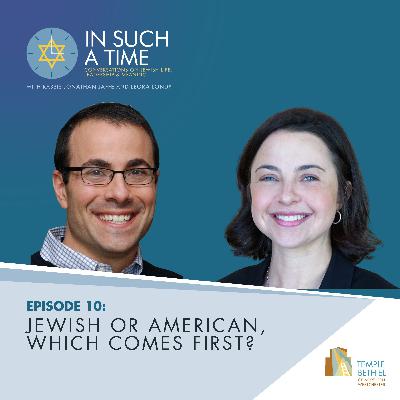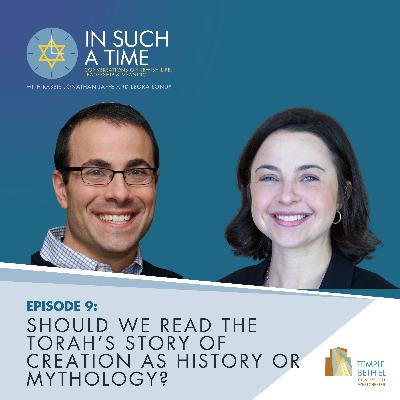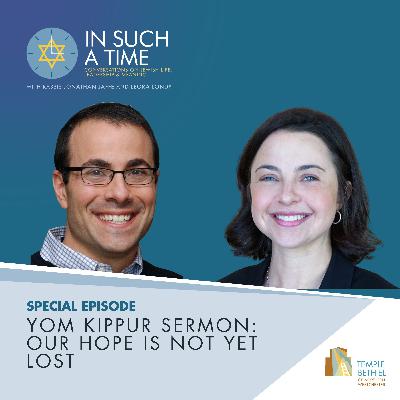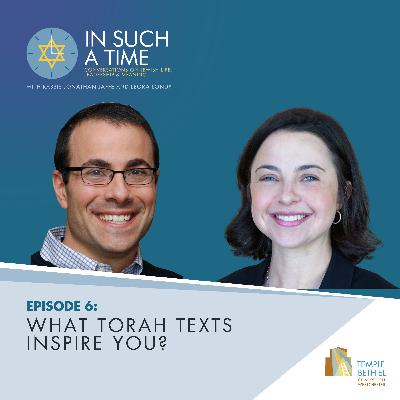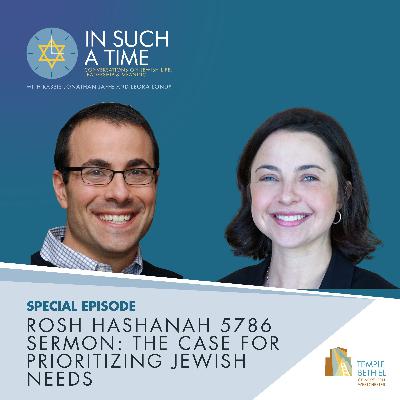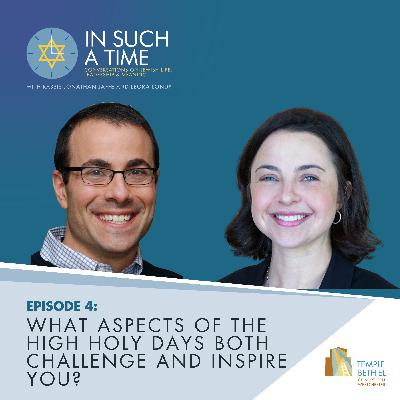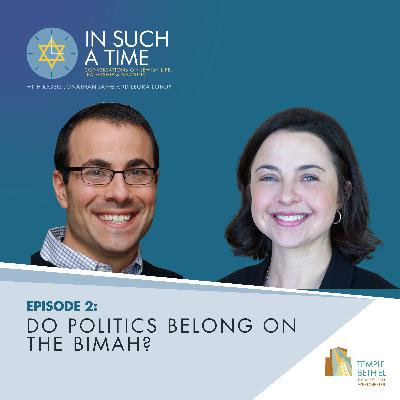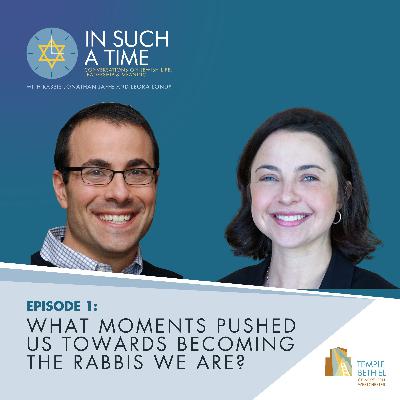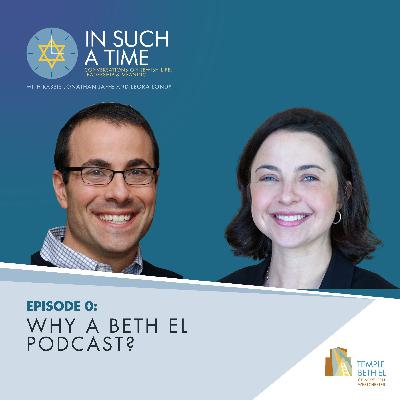Discover In Such A Time: Conversations on Jewish Life, Leadership & Meaning
In Such A Time: Conversations on Jewish Life, Leadership & Meaning

In Such A Time: Conversations on Jewish Life, Leadership & Meaning
Author: Rabbis Jonathan Jaffe and Leora Londy
Subscribed: 0Played: 0Subscribe
Share
© Rabbis Jonathan Jaffe and Leora Londy
Description
IN SUCH A TIME is a podcast from Temple Beth El of Northern Westchester, hosted by Rabbis Jonathan Jaffe and Leora Londy. Through candid conversations and thoughtful reflection, the rabbis explore what it means to live, lead, and seek meaning through a Jewish lens. From personal stories to pressing issues, each episode invites listeners into a timely dialogue about Jewish life — in such a time as this.
14 Episodes
Reverse
Is Judaism more about peoplehood than religion—and what if “Jewish pride” doesn’t involve Israel at all?This episode is bound to provoke surprising thoughts: Rabbis Jonathan Jaffe and Leora Londy dive headfirst into one of the most emotionally charged questions facing American Jews today—how central should Israel be in our Jewish identity? From generational divides to personal stories of longing and belonging, the conversation goes far beyond politics, exposing some uncomfortable truths about how our identities as Jews and Americans have evolved.Together, they wrestle with the idea of covenant versus individualism, and the loss of communal responsibility in American society. The hosts share poignant reactions to recent hostage releases in Israel, discuss the role of the Diaspora, and even turn the tables with an idea for “Reverse Birthright”—inviting Israelis to experience the vibrancy and inclusivity of American Jewish life.From family mahjong games to mandatory military service and the divide between prophetic values and peoplehood, this episode asks: What happens when the most vital parts of Judaism outgrow old definitions? Can there be space for Jews who love their tradition but feel ambivalent, or even critical, about Israel?Whether you’re a passionate Zionist, a progressive critic, or somewhere in between, this episode will give you new language—and empathy—to think about how Israel and America shape your Jewish identity.Timestamped Overview:00:00:00 – Intro to the topic: Israel’s place in Jewish identity, generational shifts, and the American-Jewish balance.00:01:15 – Rabbi Londy’s evolution from Zionist upbringing to nuanced connection with Israel and Diaspora.00:04:18 – Rabbi Jaffe: Assimilation patterns, particularism vs. universalism, impact of 1960s pride and Israel’s 1967 war.00:07:35 – The “Jewish first, American second” dilemma and thoughts on future generations.00:10:07 – Generational chapters: Baby boomers, birthright Judaism, and the new Jewish ambivalence toward Israel.00:11:06 – Rabbi Londy’s personal story: Living in Israel vs. American critique, values and Tikkun Olam.00:13:41 – Hostage releases in Israel: Emotional impact vs. religious connection; peoplehood as the heart of Judaism.00:16:12 – Seder’s four children as a metaphor for diverse Jewish responses.00:17:07 – Concerns for those who feel left out by Israel-centered Jewish life; making space for non-Israel-centric Judaism.00:20:03 – “Reverse Birthright” explained: Israelis experiencing American Diaspora Judaism, pluralism, and mutual learning.00:22:12 – Jewish learning in Israel vs. Diaspora: Talmudic roots, multi-generational debate, and complementarity.00:25:56 – Franz Rosenzweig’s warning: Political vs. spiritual Judaism, and effects in Israel.00:26:44 – Where American and Jewish values diverge: Individual freedom vs. communal responsibility and covenant.00:28:50 – Rabbi Londy and teens on activism, responsibility, and civic engagement.00:30:28 – The power of covenant in Israeli life; hostages as personal family, community strength.00:33:42 – Ultra-Orthodox exemption from Israeli military service: Covenant, collective obligation, and emotional resonance.00:34:52 – Decline of communal life and fraternal organizations in America, impact of Covid and individualism.00:37:44 – Free Palestine movement & American activism; longing for community.00:39:32 – Generational culture shifts, communal activities among boomers, and Covid’s aftermath.00:41:34 – Dreaming of “national service” in America; learning from Israeli society.00:42:20 – Closing reflections: Learning from both Americas and Israel, pride in both identities.00:42:47 – Event plug for Reform Judaism in Israel.00:43:31 – Outro and contact information.Ready for a conversation that challenges old paradigms and brings new meaning to Jewish life, leadership, and identity? Tune in now.
What if the creation story in Genesis isn’t meant to be taken literally—or even as history at all?In this thought-provoking episode of "In Such A Time: Conversations on Jewish Life, Leadership, and Meaning," Rabbis Leora Londy and Jonathan Jaffe dig deep into the cyclical return to the Torah’s origin stories and uncover how myth, memory, and meaning shape our Jewish identities.Together, they unravel the two versions of creation in Genesis, exploring why these ancient stories still captivate and challenge the Jewish imagination year after year. Is the point of rereading the Torah about discovering new facts, or about remembering deeper truths that have been with us all along? The conversation dives into Jewish tradition’s interplay between myth and reality: Why does Torah remain central even in a world of modern science, evolution, and alternative creation narratives?Rabbis Londy and Jaffe deftly bridge the gap between ancient mythologies and today’s spiritual quests, touching on the power of words, the importance of creating order from chaos, and the humbling notion that we are curators—not conquerors—of the world. You’ll also hear fascinating insights comparing the Jewish story of Eden with its Christian counterpart, and how the banishment from Eden might actually be a blessing.Their discussion gets personal with stories from Israel and rabbinical school, and wraps with hopes for renewal—not just in the Torah cycle, but in our lives and even in the future of Israel itself.Key highlights include:The mystical notion that learning Torah is actually “remembering” what’s already inside us.The significance of reading two creation stories—and why we need both a cosmic and a personal God.How Jewish tradition embraces multiple truths and resists simplistic answers.The role of time, organization, and the spoken word in the Torah’s vision of creation.Reconciling belief in science and evolution with love for the Torah’s stories.Why the Garden of Eden is not a place Jews seek to return to—and what partnership with God really means.Hopes for redemption, renewal, and deeper connection as we begin a new cycle of Torah and face new chapters in Jewish life.Timestamped Overview:00:00:00 – Welcome & Introduction to the new Torah reading cycle00:01:45 – Why Jews reread the Torah: Memory vs. learning, and the journey of Torah00:03:08 – Two Genesis stories: Cosmic vs. personal creation00:06:32 – Creation as organization, not just “making” the world00:09:20 – Creation as birth, mess, and the human struggle for order00:14:13 – The power of words in Torah and daily life00:15:01 – Jewish mythology versus other ancient mythologies00:18:38 – A rabbinic story: Can evolution and Torah coexist?00:23:13 – Why the Torah remains “our story” and shapes Jewish perspective00:25:30 – Humility and responsibility: Humanity’s role in creation00:27:31 – Eden: Why Jews embrace imperfection and creation outside paradise00:31:08 – Kabbalah, withdrawal, and the space for human partnership00:32:46 – Intentions for the new Torah cycle00:33:57 – Hopes for renewal and redemption in Torah and Israel00:36:05 – Closing blessings and wrap-upDon’t miss this rich, heartfelt exploration of how the Torah’s oldest stories continue to challenge, renew, and connect us, no matter where—and when—we read them.
What if the secret to a more meaningful, joyful year wasn’t found in a grand temple but inside a flimsy hut exposed to rain, wind, and the unknown?In this energizing episode of “In Such a Time: Conversations on Jewish Life, Leadership and Meaning,” Rabbis Leora Londy and Jonathan Jaffe invite listeners into the spiritual heart of Sukkot—the Jewish festival celebrated by literally moving life outdoors into temporary, decorated huts. Together, they reveal how this ancient holiday teaches powerful lessons on impermanence, vulnerability, and the joy of getting lost.You’ll hear Rabbi Londy’s stories of Sukkot traditions from America to Israel—think cotton-walled sukkahs on city balconies and the annual scramble for palm fronds. Rabbi Jaffe reminisces about Jewish holidays in tropical Hawaii and draws inspiration from urban adventures, showing how stepping outside your comfort zone creates deep spiritual growth.Key highlights include:Why Sukkot’s impermanence is actually grounding—and why getting “lost” is essential for spiritual renewal.Personal stories of Sukkahs destroyed by wind, rebuilt with resilience, and the beauty of inviting guests, both real and symbolic.How Sukkot rituals—decorating, gathering, petitioning for rain—build community and echo the transformative journey through the desert.Practical inspiration for making Sukkot meaningful wherever you live, from backyard tents to urban explorations and popping into bustling Jewish neighborhoods for lulav shopping.A recurring theme: that embracing fragility, chaos, and uncertainty adds color and meaning to life.If you’ve ever wondered why a holiday about living in huts can be the most joyful week of the year—or how “getting lost” might just help you find yourself—this episode will surprise and inspire you.Timestamped Episode Overview00:00 — Intro: What makes Sukkot the most joyful Jewish festival?00:20 — The heart of Sukkot: traditions, family, and outdoor living01:39 — Sukkot weather around the world and the agricultural cycle04:32 — Sukkot in American Reform Jewish life: a missed outdoor opportunity?05:41 — Sukkah shopping adventures in Israel and America07:41 — The deeper meaning: joy, tradition, impermanence, and wandering09:15 — Honeymoon or boot camp? The wilderness as spiritual metaphor11:25 — Getting lost: why stepping outside your comfort zone matters13:26 — Sukkot as grounding after the high holidays; why your sukkah must leak!14:31 — Stories: Sukkah destroyed by wind, resilience and rebuilding16:04 — Adventures in getting lost: urban biking, spiritual travel19:13 — Welcoming guests: ushpizin and revisiting Jewish history21:24 — Building and decorating the sukkah: physical and spiritual renewal23:41 — Sukkot as community celebration: Lego, magna tile, graham cracker sukkahs 24:51 — Practical tips for celebrating Sukkot, wherever you are25:57 — Experiencing Sukkot in a lively Jewish neighborhood26:19 — Rabbi Jaffe’s story of spiritual “lostness” in Turkey and Greece28:35 — Life’s fragility and impermanence: Sukkot’s lessons29:31 — Closing wishes and reflectionsReady to get lost—and discover the joy waiting outside your door? Press play and step into the sukkah!
What happens when the entire fate of a nation changes overnight?This episode of "In Such A Time: Conversations on Jewish Life, Leadership and Meaning" confronts the raw emotions and heavy realities surrounding Israel’s acceptance of a deal to end the war in Gaza and bring hostages home—a moment Rabbi Jonathan Jaffe describes as “deeply bittersweet” and Rabbi Leora Londy admits left her “speechless.”Join Rabbis Jaffe and Londy as, just hours after this historic news, they share their personal reflections, process their hopes and resentments, and grapple with the consequences for Israel, the Jewish people, and the world. Through honest dialogue, they unpack:The psychic aftermath of a two-year war: loss, trauma, reunification, and enduring painHistoric patterns and spiritual echoes from Jewish liturgy, and the meaning of “return” in Jewish historyDeep anger and disappointment with world responses, double standards, and missed humanitarian opportunitiesThe surge of antisemitism worldwide, its transformation through history, and its impact on diaspora Jewish identityThe unique moral struggles faced by the Israeli public, government, and the IDF in times of warHopes (and fear) for the “day after”: rebuilding, healing, and reimagining Israel and Jewish lifeHow tragedy renews Jewish connection, identity, and community, even in moments of insecurityIn the final moments, Rabbi Londy shares a poignant story from the Israeli front lines—a soldier, the first rain of Sukkot, and stray dogs, offering a message of hope, humanity, and unexpected beauty amid destruction.If you’ve ever wondered what it truly means to live through a moment that will be remembered for generations, this episode is for you.Episode Overview:[00:00:00] Intro & context for the episode: Israel’s accepted ceasefire and hostage deal[00:01:09] Rabbi Londy’s emotional response and reflections on historic cycles[00:03:28] Fractures, losses, bittersweet hopes, and feeling haunted by the bookends of war[00:04:38] Rabbi Jaffe’s gratitude and anger: criticism of global response and missed opportunities[00:07:29] Processing grief, resentment toward Israeli government, and nervousness about the future[00:10:11] The morality of the IDF, government missteps, and dreams for redeemed leadership[00:13:03] An “MRI” of Jew-hatred: the shocking visibility of antisemitism worldwide[00:15:31] Rabbi Londy’s hope vs. fear: Is the majority of humanity hateful or just silent?[00:17:22] Turning to Judaism in the face of threat—and the challenge of sustaining that connection[00:18:26] Three eras of Jew-hatred & Israel as the new focal point[00:22:16] Reclaiming family: Renewed bonds among Jews amid crisis[00:23:02] Personal stories: When did the rabbis first feel Jew-hatred?[00:28:18] Disagreement, worries, and hope for Israel’s future[00:31:13] A soldier, rain, and stray dogs—finding beauty and faith at war’s end[00:32:47] Closing prayers and reflections for a better future[00:33:06] Outro and resourcesListen for a gripping, deeply personal conversation that will stay with you long after the episode ends.
What if one of the most influential anthems of hope—Hatikvah—was written by a restless, misunderstood family outcast?In this special Yom Kippur episode of "In Such a Time: Conversations on Jewish Life, Leadership and Meaning," Rabbi Leora Londy unveils a deeply personal and surprising family connection to Naftali Hertz Imber, the poet behind the immortal words of Hatikvah, Israel's national anthem. Through the story of her own genealogical journey, Rabbi Londy explores not only the origins of these iconic lyrics but uncovers how hope is woven into the very DNA of the Jewish people.Join Rabbis Leora Londy and Jonathan Jaffe as they reflect on the true nature of hope in our faith tradition—how it's not just a passive feeling but an active choice and collective mission, especially in times of uncertainty and division. Hear poignant moments from Jewish history, the complexity of present-day challenges in Israel and America, and a heartfelt call for unity, resilience, and communal action. This episode will leave you inspired to not only yearn for a better world but to help create it, together.Timestamps & Episode Overview:[00:00:00] Intro: Exploring Jewish life, meaning & leadership[00:00:20] Sharing high holiday sermons with the podcast community[00:00:36] Rabbi Londy begins her sermon, introducing her Ancestry.com search and family history[00:01:39] The incredible story of Naftali Hertz Imber—a complex ancestor and the writer of Hatikvah[00:04:17] Hatikvah’s poetic message and its enduring role as an anthem of hope[00:07:05] Rabbi Jonathan Sacks’ distinction between optimism and hope[00:07:41] Grappling with hope amid modern Jewish and American challenges[00:11:40] The collective power of communal practice—how Yom Kippur reweaves the fabric of Jewish identity[00:13:38] The strength of inclusive, supportive Jewish community at Beth El[00:15:36] Personal reflections on overcoming worry, reclaiming agency, and finding hope through heritage[00:16:29] A blessing for hope, resilience, and restorative community in the new yearIf you’re seeking inspiration on how to stay hopeful—no matter how fractured the world may feel—this episode is for you.
What if the best response to rising antisemitism isn’t fighting back—but rediscovering what it means to be Jewish?In this special Kol Nidre sermon episode of "In Such a Time: Conversations on Jewish Life, Leadership and Meaning," Rabbi Jonathan Jaffe turns a conventional question inside out: How should the Jewish community respond to growing antisemitism? Instead of looking outward for acceptance or launching PR campaigns, Rabbi Jaffe urges listeners to look inward, strengthening Jewish identity and practice—for ourselves, not for external validation.Rabbi Jaffe explores the pitfalls of centering Jewishness on defense and debate, drawing on incisive insights from Jean-Paul Sartre, Rabbi Jonathan Sacks, and Sarah Hurwitz. He introduces the concept of the “reverse Marrano”: those publicly Jewish but privately disconnected from Jewish substance, and challenges the community to move from contentless identity to meaningful observance.Through moving, real-life stories—from recent converts to lone soldiers, and families deepening their practice in the wake of October 7th—Rabbi Jaffe illustrates how crisis can become the catalyst for personal and communal transformation. The episode closes on a practical, hopeful note: small steps anyone can take to foster Jewish knowledge, pride, and resilience in the face of adversity.Key highlights include:Why attempts at “better PR” or public empathy often fall short and can even be counterproductiveThe historical and philosophical roots of antisemitism, and why internal strength is a more resilient responsePersonal stories from within Rabbi Jaffe’s community that reveal powerful awakenings of Jewish identity after October 7thActionable ways to build deeper Jewish practice—starting with making Shabbat meaningful at homeThis is a must-listen for anyone grappling with Jewish identity, antisemitism, or spiritual resilience in challenging times.Timestamped Overview:[00:00:00] Introduction and setting the stage for Kol Nidre and Yom Kippur reflections[00:00:20] Rabbi Jaffe frames the question: How should Jews respond to rising antisemitism?[00:01:55] The pitfalls of focusing on PR and defending against criticism[00:04:10] Why seeking approval or external validation is a losing strategy[00:05:17] Deep historical roots of antisemitism and modern implications for Israel[00:06:08] The call to turn inward and embrace authentic Jewish identity[00:06:53] The concept of the "reverse Marrano" and its relevance today[00:09:35] How October 7th triggered reassessment and stronger Jewish engagement[00:10:47] Stories of hostages and their families deepening Jewish observance[00:13:24] Three powerful stories from Rabbi Jaffe’s own community post-October 7th[00:14:48] Reflections on conversion and embracing Jewish identity despite adversity[00:15:36] The journey of a young man choosing to join the IDF as a lone soldier[00:17:00] Personal ritual shifts and building connection through Jewish practice[00:19:45] Moving from a reaction to hate toward building lasting, meaningful Jewish life[00:21:41] The potential for blessing born out of crisis[00:22:45] Practical, inspiring recommendations for deepening Jewish involvement[00:25:12] Closing and invitation to engage furtherListen now to be challenged, inspired, and empowered to answer hate not with defense, but with the strength of authentic living.
What if the Torah’s “rules” were actually designed to help us live more grateful, flexible, and fully human lives—and not simply to restrict us?In this illuminating episode of "In Such a Time: Conversations on Jewish Life, Leadership and Meaning," Rabbis Jonathan Jaffe and Leora Londy pull back the curtain on some of the most surprisingly radical and emotionally resonant teachings in the Jewish tradition.Timed with Simchat Torah and the annual restarting of the Torah reading cycle, this episode takes listeners on a journey through personally meaningful verses and texts. Rabbi Jaffe reveals how a biblical call for 100 daily blessings isn't just about rote gratitude, but about living in a state of constant "wow" and appreciation—even on the hardest days. Rabbi Londy shares how one of Jacob's most vulnerable moments teaches us about self-knowledge, transformation, and the ongoing possibility for change and awakening.You'll also hear them boldly reframe the often-misunderstood Book of Leviticus—not as an outdated manual of sacrifices, but as a groundbreaking model for empathy, ritual reintegration, and making space for those who have suffered or faltered. And through stories ranging from childhood rituals to the challenges of parenting, they wrestle honestly with what it means to build meaningful structures for gratitude, apology, and second chances.Some highlights from the episode:The secret history behind the tradition of saying 100 blessings every day—and how it refocuses your attention on life's overlooked miraclesWhy Jacob, the Torah’s “most imperfect” patriarch, might be the ultimate model for growth, humility and spiritual awakeningThe deeply countercultural idea in Leviticus that illness or failure doesn’t define you, and how ancient rituals point to the need for full rehabilitation and belongingThe powerful message of the “Second Passover”—and what it teaches us about letting ourselves try again when we’re not ready or able to get it right the first timeHonest reflections on ritual vs. intention, spiritual fitness, and how both rabbis build gratitude and awareness into ordinary daily routinesPerfect for anyone curious about how ancient texts can speak to modern lives, leadership, and personal meaning, this episode is an inspiring start to a new Torah cycle.Timestamped Overview:00:00 — Introduction & Simchat Torah framing00:59 — Rabbi Jaffe’s ordination story and Deuteronomy 10:12: 100 daily blessings, gratitude, and the structure of Jewish gratitude rituals05:07 — Rabbi Londy on gratitude routines, the neurotic mind, and noticing everyday miracles (like kitchen window bunnies)10:51 — Mindfulness through Jewish rituals: blessings, food, and the Jewish calendar13:12 — Transformative family rituals: Three daily gratitudes and bedtime prayers14:30 — Rabbi Londy’s text: Jacob’s awakening and discovery of holiness in Genesis 28:1618:05 — Ego, spiritual self-knowledge, and the Hasidic interpretation of “God was in this place and I, I did not know it”21:00 — Torah as descriptive, not prescriptive: embracing imperfection and realness22:41 — Rabbi Jaffe on Leviticus as a radical text: inclusion, rehabilitation, and the difference between illness and sin26:11 — Empathy for leaders, Miriam’s story, and rethinking punishment and process of return29:35 — Controlled violence in ritual and society—ancient and modern parallels33:01 — Rituals of repentance vs. our modern hunger for “blood” and spectacle34:09 — Rabbi Londy: Second Passover and the Torah’s surprising flexibility on second chances39:01 — Adapting rituals, flexibility, and the evolution of Jewish practice43:31 — Recommended readings & closing encouragement to engage with the Torah anewReady to see the Torah—and yourself—through new eyes? Listen in and discover the wisdom you didn’t expect.
What if the God you reject isn’t the only God Judaism offers?As the High Holidays approach, Rabbis Jonathan Jaffe and Leora Londy open up a candid and often surprising conversation about the nature of God and belief in Jewish life. In this episode of "In Such a Time: Conversations on Jewish Life, Leadership and Meaning," the rabbis push beyond the familiar “God as parent” metaphor of the holiday liturgy and reveal the extraordinary spectrum of Jewish theological thought.Discover how doubt, contradiction, and even “not knowing” are profoundly Jewish ways of relating to God. Rabbi Londy shares how her personal theology shifts from day to day, while Rabbi Jaffe discusses why he envies the comfort that some find in a personal, listening God—even as his own beliefs are grounded in rationalism and the philosophy of Maimonides. Together, they unpack classical and modern Jewish thinkers from Kaplan and Heschel to Buber and wrestle with the limits (or lack thereof) of individual belief.Key highlights include:Why the prayer “Avinu Malkeinu” (Our Father, Our King) holds both contradiction and possibility.What happens when we read sacred text literally—and what congregants don’t know about how rabbis themselves pray.The vital role of community, obligation, and spiritual practice—and why spirituality is more like working out than you think.How theology shifts in the wake of suffering, tragedy, and even the Holocaust.A curated reading list for deepening your own exploration of Jewish thought.Whether you’re a seeker, skeptic, or someone who’s always wanted to believe, this episode invites you to rethink what it means to relate to God—and to find your own place in the conversation.Timestamped Overview:[00:00:00] Intro and framing: God talk during the High Holidays; the limits of “God as parent.”[00:01:57] How rabbis read (and sometimes reject) literal prayers; permission to define your own relationship to God.[00:04:32] Personal stories of evolving faith, doubt, and daily theology.[00:05:47] Rational vs. non-rational concepts of God; Maimonides, Kaplan, and Jewish options for belief.[00:13:17] Are there boundaries to what God can mean in Judaism?[00:16:03] “God as gravity”—Rabbi Jaffe on philosophic rationalism and aligning with the cosmos.[00:23:41] Heschel, Buber, and the power (and limits) of a personal God.[00:26:48] Practice, obligation, and the shape of Jewish life; “feel-good” Judaism vs. halachic commitment.[00:31:13] Theodicy—grappling with God and suffering (from biblical times through October 7th).[00:37:08] The significance of community and spiritual “muscle memory.”[00:43:03] The contradictions within sacred language, especially “Avinu Malkeinu.” [00:44:33] Book and resource recommendations for further exploration.[00:46:41] Closing thoughts and invitation to confront your own questions about God.Listen in to discover a profoundly honest, challenging, and liberating exploration of what—and how—you might believe.
What if the very value that defines American Judaism is the one holding it back in its hour of greatest need?In this eye-opening Rosh Hashanah sermon speical episode of "In Such a Time: Conversations on Jewish Life, Leadership and Meaning," Rabbi Jonathan Jaffe takes listeners on a deeply personal and provocative journey, exploring the seismic shift in Jewish identity and priorities after October 7th. Drawing from his own emotional struggles and the collective anxieties of the Jewish community, Rabbi Jaffe challenges decades of outward-focused activism and asks: In an era when antisemitism is on the rise and old alliances feel more fragile than ever, what do Jews owe to themselves—and to the world?Key highlights of this riveting sermon include:A sobering look at how interfaith solidarity for the Jewish community has frayed post-October 7, with tangible stories from canceled events and activist betrayals.The roots and rapid rise of tikkun olam as the core of American Jewish identity—and why Rabbi Jaffe warns it might be a double-edged sword.Insightful analysis on the tension between self-preservation and universalism, invoking Hillel’s famous teaching: “If I am not for myself, who will be for me? But if I am only for myself, what am I?”Real-world examples of Jewish institutions striking the balance, from the historic Jewish aid societies to Krakow’s Jewish Community Center supporting both Jews and non-Jewish Ukrainian refugees.A heartfelt call to reclaim Jewish pride and self-advocacy, without losing the ethical imperative to care for the stranger.Join Rabbi Jaffe as he proposes a new path forward—a “golden mean”—for Jews navigating an uncertain future, and challenges all listeners to reconsider how we define belonging, solidarity, and moral responsibility in troubled times.Episode Overview00:00:00 – Intro to the special High Holiday episode00:00:20 – Rabbi Jaffe introduces the central question: What do Jews owe the world post-October 7?00:02:23 – Examples of fractured alliances and rising antisemitism00:05:12 – The Torah’s radical lesson: Never become Egypt, even when abandoned00:07:27 – American Jewish history: From self-preservation to tikkun olam00:11:53 – The risks and limits of tikkun olam as core identity00:16:11 – Jewish vulnerability and the need for recalibration00:20:57 – Rav Huna’s centuries-old guidance on navigating dual responsibilities00:23:16 – Modern models: How the Krakow JCC balances caring for Jews and non-Jews00:24:34 – Gratitude for interfaith partners and call to action for Jewish pride and care for all00:26:18 – Final blessing and closing remarksReady for a conversation that will challenge, inspire, and redefine your understanding of Jewish purpose? Hit play now.
What if the most important Jewish holiday isn’t the one you think it is? And what if the rituals you grew up with are the very things holding you back from a more meaningful holiday experience?In this eye-opening episode of In Such a Time: Conversations on Jewish Life, Leadership and Meaning, Rabbis Jonathan Jaffe and Leora Londy dive deep into the High Holidays—unpacking personal childhood memories, family legacies, synagogue culture, and the surprising ways that stress, boredom, confusion, and even teenage flirting have all shaped their connections to Rosh Hashanah and Yom Kippur.Together, they challenge the dominance of guilt and atonement-centric themes, ask if fasting might eclipse the deeper purpose of Yom Kippur, and reflect on the difference between simply showing up for holidays and truly making Jewish life meaningful year-round. With stories ranging from bike-filled streets in Israel to behind-the-scenes synagogue preparations in the US, this conversation invites you to rethink what it really means to celebrate, atone, and renew.Key highlights include:Rabbi Londy’s powerful early memory of visiting hospital patients on Yom Kippur—and learning Judaism is as much about action as about prayerRabbi Jaffe’s honest admission of a “problematic” relationship with the High Holidays and the secrecy of prayerbook traditions that left him bewildered as a childHow the narrative of fasting can undermine the intention of Yom Kippur, leading to hunger over holinessWhy Jewish education models may sow seeds of alienation and how context is everything for spiritual connectionThe contrast between Jewish observance in Israel and America, and how cultural immersion (or isolation) shapes the seasons of meaningHonest reflections on disappointment, optimism, and the practice of forgiveness—both with others and oneselfThe ritual and symbolism that follows Yom Kippur—like building the sukkah—as powerful metaphors for doing and becomingWhether you’re a lifelong synagogue-goer or someone who only peeks in on the High Holidays, this episode will challenge your assumptions, spark some laughter, and just might inspire you to embrace the holidays in a new way.Episode Overview with Timestamps:00:00:00 – Intro and episode setup00:00:54 – Childhood memories: nerves, stress, and meaningful action00:03:14 – Growing up fidgety, confused by synagogue traditions00:06:11 – “Wow”, “Ouch”, and “Oops”: What Jewish prayer really means00:08:25 – Why the High Holidays don’t represent the whole Jewish experience00:09:59 – Communal responsibility and the value of atonement00:12:42 – Jewish education, missed opportunities, and lasting impressions00:15:30 – The problem (and machismo!) of fasting on Yom Kippur00:20:15 – The power of preparation: Behind-the-scenes and in Israel00:25:46 – The difference environment makes: Jewish life in the diaspora vs. Israel00:28:01 – The unexpected optimism of Yom Kippur—do we ever really “finish”?00:29:33 – Vulnerability, forgiveness, and the beauty of trying again00:31:22 – Ne’ilah in Israel, the joy at the close of the holiday00:34:21 – Sweet rituals: Symbolic foods and building the sukkah00:35:12 – Final blessings & takeaways for a meaningful High Holiday seasonReady to be shocked—and renewed—by the High Holidays? Tune in now!
What if the secret to kids loving religious school isn’t magic—it’s goats, butterflies, and a radical rethinking of Jewish education?In this lively episode of In Such a Time, Rabbi Jonathan Jaffe sits down with Rabbi Educator Maura Linzer to reveal the rarely-shared story behind Temple Bethel’s explosive school growth and joyful, inclusive culture. Discover how Rabbi Linzer pivoted from traditional rabbinic track to innovative educator, championing educational practices that mirror—and sometimes push past—the best of public school standards. From differentiated learning and tailoring programs for kids with IEPs, to the beloved annual baby goat visit (yes, real goats!), this episode uncovers practical and heartwarming strategies making Jewish education a magnet for families from across the region.Key highlights include: how the school connects with parents as partners and primary educators, embraces kids with diverse learning needs, weaves in Israeli emissaries for real-world connection, and sensitively approaches complex subjects like Israel and the Holocaust. Plus: hear how the curriculum gets creative with costumes, theme songs, and enrichment activities that keep kids running towards religious school, not away.Stay to the end for a rapid-fire Q&A where Rabbi Linzer shares her local Pittsburgh favorites and her vision for the next decade of Jewish learning.Episode Overview:[00:00:00] Intro[00:00:20] Meet Rabbi Maura Linzer and her journey into Jewish education[00:01:16] The unlikely start: from rabbi to passionate educator[00:02:41] Building lay partnership and professionalizing religious school[00:04:44] What makes Temple Bethel’s approach unique—and a community draw[00:05:36] Inclusion, special needs, and a team of 70+ teen teachers[00:07:26] Innovative programs: baby goats, chickens, and hands-on learning[00:09:30] Making synagogue a second home: joy, creativity, costumes, and music[00:11:57] Inside the educational philosophy: inclusion, movement, and differentiated instruction[00:17:33] Empowering parents as primary Jewish educators[00:18:52] Teaching Israel: community, complexity, and real-world voices[00:23:55] Age-appropriate, immersive Holocaust education[00:25:52] Retaining and inspiring teens beyond B’nai Mitzvah[00:28:45] Personal favorites, Pittsburgh tips, and vision for the future[00:33:00] Closing and gratitudeTune in for a blueprint of how Jewish education can be daring, joyful, and truly life-changing.
What if your rabbi stood on the bimah and told you exactly how to vote? Would it strengthen your faith—or make you walk out the door?This episode of "In Such a Time: Conversations on Jewish Life, Leadership and Meaning" pulls back the curtain on a heated debate most congregants never witness: To what extent should rabbis use their authority to advocate for political positions from the pulpit? Join Rabbis Jonathan Jaffe and Leora Londy as they bravely lift the lid on their own impassioned disagreements about the role of politics in synagogue life, revealing not only their intellectual differences but also the profound respect that keeps them united in purpose.Key highlights from the conversation include:Honest, behind-the-scenes struggles over whether clergy should speak about political issues like immigration, democracy, and Israel—and the price of silence in divisive times.Confessions about the tension between being a prophetic voice for justice and a pastoral presence for community cohesion.Real-life stories from the rabbis’ personal lives, including family synagogue choices impacted by politicized sermons and the moral quandaries of advocating for immigration reform or installing solar panels—right down to risking alienation and controversy.A mutual reckoning with the privilege and responsibility inherited from Jewish history, and the challenge of applying ancient Torah values to messy, modern issues.Reflection on how new platforms like podcasts reshape rabbinic influence and maintain deep connections with the Jewish community, even as the meaning of "speaking from the bima" evolves.Will the rabbis find common ground, or are some disagreements just too fundamental to bridge? Listen in for a candid, urgent, and deeply personal exploration of what it means to lead—and unite—a community in times when politics can divide us most.Episode Overview & Timestamps[00:00:00] – Intro: Setting the stage for this week's controversial conversation[00:01:16] – Rabbi Londy reveals her passion (and frustration) about addressing politics on the bima[00:04:41] – Rabbi Jaffe brings humility—and historical perspective—to the debate[00:08:38] – The sermons’ purpose: Should rabbis help congregants process current events?[00:12:11] – Prophet or pastor: How rabbis juggle the roles of comforter and challenger[00:14:03] – Difficult questions: What are truly "Jewish values" in political policy?[00:16:11] – Immigration and dignity: Personal stories and Torah wisdom[00:19:40] – Means vs. ends: Where shared values lead to political disagreement[00:23:05] – To act or just reflect? Why discomfort can be powerful[00:25:41] – Volunteerism vs. political activism: Where do synagogues draw the line?[00:29:19] – The "elephants in the room": Israel, America, and double standards[00:33:54] – The evolving role of the rabbi: From the bima to the podcast[00:36:53] – Final reflections: The risks of silence, the value of connection, and an open invitation for listener feedbackDon't miss this episode—it's a rare and thought-provoking look into the moral and practical dilemmas shaping today's American Judaism.
What do a rebellious Bat Mitzvah, hidden synagogues across Europe, and a chance encounter with a future member of Israel’s Knesset have in common? They’re all formative moments on the unexpected journeys of two rabbis!In the very first episode of "In Such a Time: Conversations on Jewish Life, Leadership, and Meaning," Rabbis Leora Londy and Jonathan Jaffe pull back the curtain on their personal paths to the rabbinate, sharing the pivotal stories, questions, and challenges that shaped their sense of Jewish identity and communal calling. From Leora’s childhood in a rabbinic family—her mom teaching her to put on tefillin, her dad preparing the four species for Sukkot with the help of a Seventh Day Adventist—to Jonathan’s coming-of-age as one of Hawaii’s few Jewish kids, the episode explores how roots, rituals, and travels far from home can spark a lasting devotion to Jewish leadership.Highlights include tales of feeling “Jewishly out of place” from Honolulu to Herzliya, the thrill (and tension) of entering synagogues and Jewish quarters while backpacking Europe, navigating gender roles in Israeli religious life, and the sometimes surprising realization that a simple act—or a single phrase from a teen—can change a life and inspire a rabbinic calling.Tune in for an honest, reflective, and often humorous conversation about forging a meaningful Jewish life, the power of peoplehood, and what it takes to guide a community in such a time.Episode Overview & Timestamps:00:00:00 — Intro to the podcast and hosts’ intentions for exploring their rabbinic journeys00:01:23 — Leora’s upbringing in a rabbinic household; tefillin, sukkot, and interfaith moments00:04:24 — Jonathan’s childhood as one of the only Jewish kids in Honolulu, creating Camp Menorah, and what it meant to “build Judaism” from scratch00:07:04 — Leora’s formative gap year in Israel: testing different Jewish communities, gender roles in worship, and the influence of feminist Jewish leaders00:13:14 — Jonathan’s discovery of Jewish peoplehood on a backpacking trip across Europe, finding unexpected family in Jewish quarters and synagogues00:18:08 — Leora’s cultural awakening in Herzliya, building bridges across Jewish diaspora, and the turning point that led her to the Reform rabbinate00:24:43 — Jonathan’s “wandering” twenties: failing at corporate life, finding purpose at a shul in San Francisco, and how a teen’s kind words sparked his rabbinic pursuit00:32:55 — Reflections on impact: how small acts and words can shape destinies, and the importance of gratitude in Jewish life00:33:46 — Closing thoughts and thank yousSubscribe and listen for more candid stories and conversations about Jewish leadership, identity, and meaning.
What if the most sacred conversations in your synagogue—those spontaneous, passionate, and even disagreeing voices—could offer a new blueprint for Jewish life, leadership, and meaning in today's turbulent world?In Such a Time: Conversations on Jewish Life, Leadership, and Meaning debuts with an episode that does just that, pulling back the curtain on private rabbinic dialogue and inviting you into an intimate, surprising, and refreshingly authentic space.In this vibrant kickoff episode, special guest host Lou Diamond sits down with Rabbis Jonathan Jaffe and Leora Londy to introduce their vision for the show and the deeper purpose that inspired them: to model what it means to hold sacred, honest conversation—even when you disagree. Discover how moments of holiness arise not only during public worship or formal ritual, but in spirited, unscripted debates that bridge differences in beliefs, experiences, and backgrounds.Key highlights include:The real impetus behind launching the podcast—and the surprising ways podcasting shapes community relationships.Why sharing “sacred disagreements” on-air is vital for the future of Jewish dialogue.What WON’T be in this podcast (spoiler: no congregational gossip or partisan shouting matches).Unique glimpses into the hosts’ lives: dream activities, secret ambitions (including a rabbi’s standup comedy goal!), and unexpected kayaking adventures.How the nuances of loving Israel, and being Jewish in Diaspora, will shape ongoing conversations.The commitment to tackling tough questions around Jewish peoplehood, boundaries, calendar, and identity—without shying away from complexity.Whether you’re seeking deeper Jewish meaning, new approaches to tough questions, or simply longing for the kind of honest conversation that strengthens real community, this episode is your invitation.Episode Overview:[00:00:00] Introduction: Welcome and what’s really behind “In Such a Time”[00:00:50] Meet the Hosts: Rabbi Jaffe and Rabbi Londy share their journeys[00:01:36] Why a Podcast?: The power and hidden intimacy of audio[00:03:03] The Origin Story: From private office conversations to the public[00:04:51] What to Expect: Jewish life, Diaspora, Israel, peoplehood—and respect for disagreement[00:07:29] What to Expect (and What You Won’t Hear): Protecting privacy and steering clear of politics[00:08:39] The Hosts’ Hopes: Sparking bigger conversations, serving more than just their own congregation[00:10:24] Getting Personal: Quick-fire questions reveal the rabbis’ human side[00:16:18] Closing Thoughts & How to ConnectSubscribe for a front-row seat to the conversations that are reshaping community, faith, and leadership—one radically open, honest dialogue at a time.


